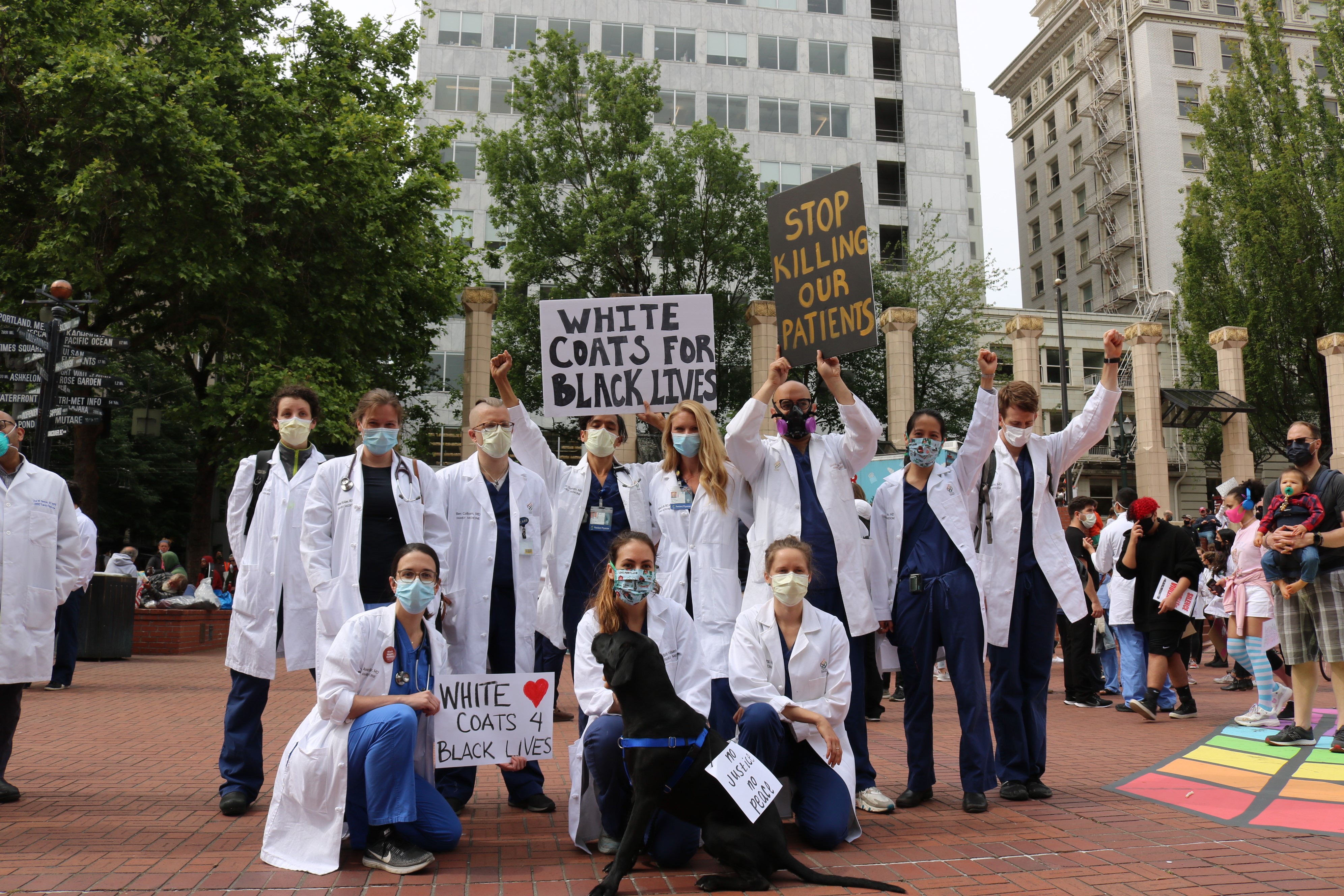Health Equity at OHSU Family Medicine Residency
Residency Statement of Purpose and Commitment to Anti-Racism and Anti-Oppression
The OHSU Family Medicine Residency in Portland trains leaders in healthcare, rooted in a legacy of social justice movements from the 1960s. We acknowledge that the broader health system has long perpetuated racism and other forms of oppression, which continue today.
As a residency program, we are committed to practicing healthcare that promotes authentic relationships and healing. This commitment guides how we build teams, care for patients, partner with communities, teach trainees, educate ourselves, and envision a healthcare system that promotes health equity, dignity, and access for all.
Our health equity curriculum spans all four years of residency, integrated into all aspects of our training. Additional support is available for individual academic and professional work, especially in the third and fourth years.
Highlights of the curriculum include:
- Longitudinal curricular thread through all four years of residency
- Community organizing curriculum
- Flexible time in the third and fourth years for resident-driven learning experiences
- Dedicated time and support for equity-focused capstone projects
- Various clinical, research, and leadership opportunities
We believe all clinical care should be rooted in social justice values, aiming to promote health equity. Our clinical experiences allow learners to work with populations impacted by structural inequities, including those marginalized by racism, poverty, and other forms of oppression.
Key clinical sites and experiences:
- Richmond Federally Qualified Health Center (continuity clinic site)
- Scappoose Rural Health Center (continuity clinic site)
- Family Medicine Inpatient Service (admitting service for various populations)
- Substance Use Disorder Treatment, including MAT (in all clinics)
- Substance Use Disorder in Pregnancy Care (Project Nurture treatment collaborative)
- Gender Affirming Care (all continuity clinics)
- Integrated behavioral health (all continuity clinics, Unity Inpatient Mental Health Facility, Behavioral Health Rotations)
- Virginia Garcia Clinic Rotations (predominantly Spanish-speaking population)
- Rural Medicine in Enterprise, OR
- Reproductive medicine and abortion care training
- Benson Polytechnic High School School-Based Health Center
- Electives: Prison Medicine, Residential addictions care in Southern Oregon
Our curriculum includes leadership training, with opportunities for residents to complete an integrated leadership fellowship. Residents regularly serve as board members and on committees at OHSU and with city and statewide organizations, such as the Oregon Academy of Family Practice (OAFP) and the Oregon Health Authority.
Residents also have the opportunity to participate in the Relational Leadership Institute (RLI), which focuses on relational skills, team dynamics, power and privilege, difficult conversations, and integration of values-based team and leadership skills to drive equity in healthcare.
The OHSU Department of Family Medicine has a large, robust, and nationally recognized research division. Residents can engage in practice-based, healthcare system, insurance, and other translational research efforts. Capstone time and support are built into the residency program.
Examples of equity-focused capstone topics from recent graduates include:
- Implementing an Air Conditioner Distribution Program
- Enhancing Abortion Care Delivery
- Obstetric and Newborn Services in Rural and Frontier Oregon
- Food as Medicine - Evaluating a Vegetable Prescription Program
- Addressing Gender Bias in Remediation and Feedback
- Anti-Racist Structural Competency Training for First Year Medical Students
- Community Health Needs Assessments of the Asian American Population
- Medical Legal Partnerships
- Landscape of Pregnancy Care in the Safety Net Setting
- Virtual Residency Interviews
- Equity and Inclusion Curriculum in Family Medicine Residency
- Mental Health in Portland’s Muslim Population
- Evaluation of Health Equity and Social Justice Reading and Discussion Group
- Patient Perspectives of Project Nurture
- Planning School Health Services in Scappoose School District
- Food Insecurity Project at Benson School-Based Health Center
- Objective Structured Clinical Exam (OSCE) to Improve Transgender Health Care
- Medication Assisted Treatment for Opioid Use Disorder
- Hospital-based Medical Legal Partnership
- Family-Centered Neonatal Opioid Withdrawal Syndrome (NOWS) Care
- Opiate Use Disorder Capstone
- Adventure Therapy for Addiction Treatment
- Depression and ACE Screening in Pregnancy
In addition to striving for excellence in teaching health equity principles and providing high-quality leadership training, we aim to create an environment where patients, residents, faculty, and staff from diverse backgrounds feel safe, connected, and well-supported.
